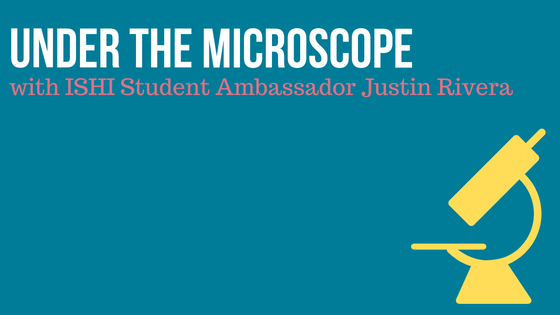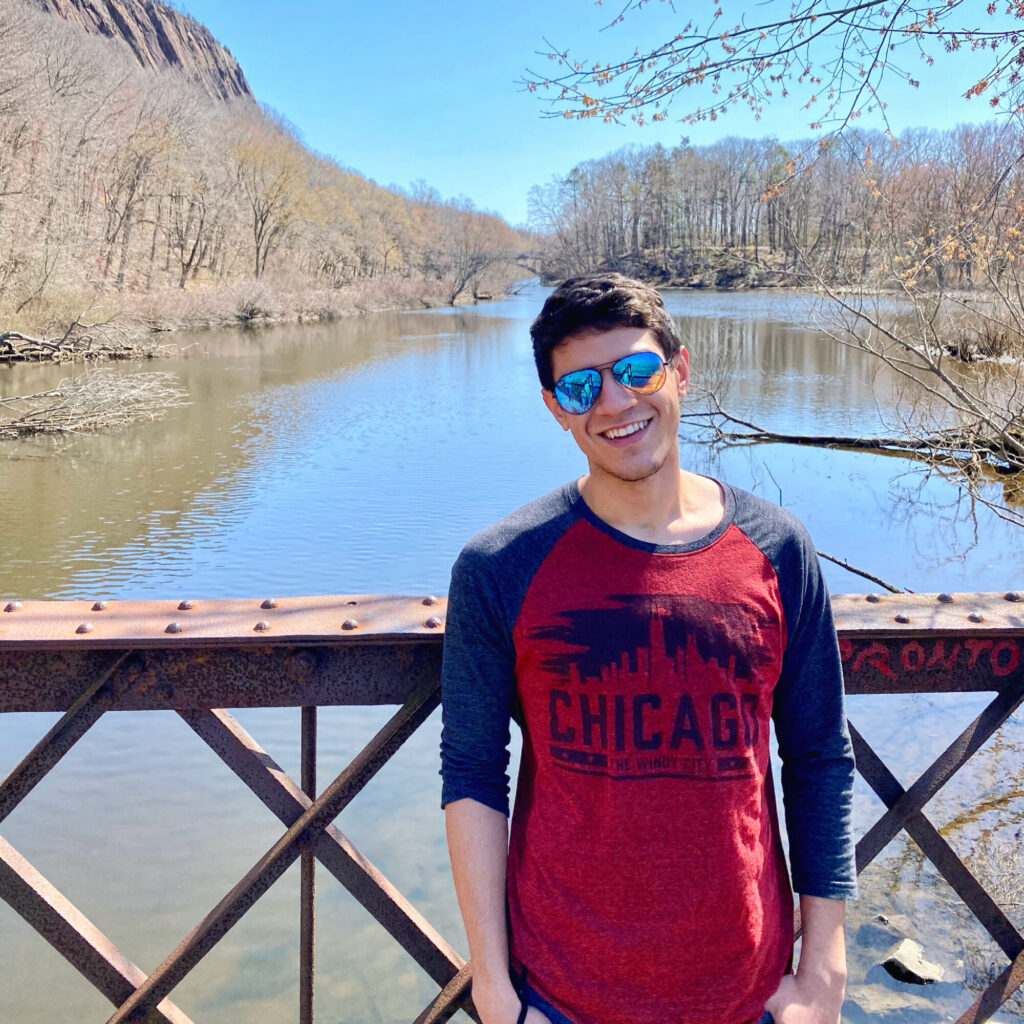Justin Rivera is working towards his MSFS in Forensic Science at the University of New Haven and will be representing ISHI as a Student Ambassador this year. Even though he is only in the first year of his masters’ education, he does not regret pursuing this career path, even if it is an exacting and meticulous profession. At this moment, his academic confidence in forensic science has only been growing, no matter how fast-paced it has been. Beyond coursework, he has been able to instruct and guide other students as a teaching assistant, which has reaffirmed how eager he is for the next steps in his career. Alongside this, he has narrowed down further what type of forensic scientist he wants to be: an investigative genetic genealogist. Ever since beginning his thesis work with Dr. Claire Glynn and the coursework within the forensic genetic genealogy certificate program, he has been consistently looking for ways to integrate myself into this field. Justin knows that as he continues to learn and grow, he will one day be an asset to an investigative genetic genealogy unit.
Looking forward to next fall’s ISHI conference, Justin’s goal is to start integrating himself within the forensic DNA community, seeing his attendance as an opportunity to network with others with different experience levels and one that builds upon his current knowledge of forensic DNA. Engaging with new types of research, technologies, and experts in the field will continue to inspire him and his future aspirations to devote himself to the forensic DNA career path. he hopes attending ISHI will allow him to connect with the leaders in both forensic DNA and investigative genetic genealogy, whose research and webinars he has engaged with and learn the best way to take the next steps in his career.
We caught up with Justin and asked him to tell us a little more about himself, including how he became interested in forensic science, what he plans to do after he graduates, and what he’s most looking forward to at ISHI this year.
Justin, thank you for talking with us today. Can you tell us a little bit about how you become interested in forensic science?
I will have to admit that I am one who religiously used to watch CSI and true crime shows, and even went back to completely watch the entire franchise. This, in combination with my love for the horror genre, guided me towards my first career aspiration as a seventh-grader: a medical examiner.
As time went on and I explored my interests in the biological sciences, I ended up falling in love with genetics very late in my undergraduate career. From that point on, it was almost like a fitting room trying to decide what I wanted to do within genetics. I knew there were certain routes I could take, but nothing stood out to me as something I truly wanted to do. I remember specifically feeling down about being at almost a ‘brick wall’ and it was while sitting in my forensic botany class I looked up “Is forensic science a real career?”.
It may seem like a silly statement, but I had grown to believe it was more of a TV thing than a reality. I had almost little to no exposure to real forensic science until the sole forensic botany course at my undergraduate university. Realizing it was possible to become one- I did heavy research on how to make this newfound dream happen. In a way, I had always really been interested in the field even as young as seventh grade- I just did not know when I would realize that I could be a part of it.
What do you like most about working in the forensics field?
I think what I love most about learning and teaching in the forensics field is how meaningful and practical it is.
I used to tell myself that I want what I do to have a visible impact on society-working in the forensics field would make that goal attainable. Beyond the whole fictional crime series/shows, forensic science is truly making a difference in resolving certain crimes. It may not always be the headliner or where all the accolades go when cases are solved- but how I see it, forensic scientists are almost the unsung heroes of any solved case. I see constant innovation and new tools meant to uncover different truths about a case and without forensics, I believe there would be so many missing pieces to the criminal justice puzzle. I see it as important work and when I get that first experience in an actual position, I know that going in every day what I am doing, makes a difference.
In another light, it is just an exciting field for science in general. When I first learned about all the caveats in the field, I realized that there was so much science involved- ranging from chemistry to physics to entomology- it encompasses a lot of disciplines. I know for myself; it adds a component to my passion to work in this field when I see every little scientific principle, I have spent years learning about utilized daily. From the lens of a young scientist, forensic techniques, technology, and ideas are tested & practiced daily and it acts as a reminder that all of those years of learning the complexities behind biology were worth it.
Can you describe your area of interest for our readers?
My area of interest is forensic /investigative genetic genealogy (FIGG). Before this I knew this area existed, I came in intending to research general forensic DNA analysis. I had always been looking for a “home” for my love of genetics and initially, that was why I wanted to gain the proper education and become a Forensic DNA Analyst. It was at the University of New Haven where I grew with F/IGG and learned how valuable the tool has become for not only regular cases but also cold cases and the DNA Doe Project. I desire to be a part of the field someday and am excited to learn even more about it this upcoming fall.
What are you most looking forward to at ISHI this Fall?
I am most looking forward to meeting and listening to the experts and speakers I have spent so much of my recent time watching virtually- whether it be a webinar or episode. For some, ISHI might be almost a once-in-a-lifetime experience in which they get to spend time with the people responsible for paving the way for innovative forensic DNA tools. Diving deeper into this, I am beyond excited to get even more a hands-on experience with F/IGG at a workshop or a talk and see what opportunities there are within the field to gain more knowledge or discover a potential career path.
What are you hoping to do after college?
I am hoping to work/ train as either a forensic DNA analyst or a part of a F/IGG team after acquiring my master’s degree. I want to garner experience working in the laboratory and utilize the skills I have been learning and refining over the years. With that said, if an opportunity presented itself to work on a F/IGG team, I know I would take it in a heartbeat.
Do you have any advice for others looking to get into forensics?
My best advice for those looking to get into it is to prepare yourself early and to “stick with it”. Forensic science is a field that does require certain disciplines to be a part of one’s education, depending on what part of the scope you are looking to one day join. I realized my dream of working in the field a little late, but not too late. I had to cram in full course loads in my last two years and they were not all easy. Luckily, I have achieved my goals and am now “preparing early” for the next steps in my forensic science career- but if I were to practically help anyone who has even a small interest in forensics- it would be to tell them to start learning it as soon as you can. There are certain advantages I missed out on by starting late with learning forensic science and I want any future students/scientists to be as prepared as they can be.
The more important, yet a general piece of advice is to stick with it. I do not see forensic science as an easy field to be in whatsoever. I mean there is a huge difference between doing science and writing research vs. presenting scientific findings in a court case or a legal setting. These are two major fields that are combined in a criminal justice field that which one’s testimony matters! I am not ashamed to admit this field was scary at first and still presents its challenges every single day. There have been times when I have felt I may not thrive in a field like this or see myself reaching the goals I had planned- but I have always remained and adapted. As an example, for the first forensic laboratory internship, I applied for I was rejected flat out and almost switched up my career goals. If it was just only interest, I would’ve given up but I knew it was much more than just that. To sum up what advice I am trying to demonstrate is this: I want any future students/forensic scientists to understand that a lot of the challenges will come with navigating the field, and you can navigate with them. See every challenge as an opportunity to learn and grow and focus on the passion or drive that brought you to the field in the first place.
Since we’ll be near Washington D.C. this year, if you were President of the lab for a day, what would you mandate?
If I were president of the lab for a single day, I would mandate that everyone send in their favorite lunch/break food order so that we all could have exactly what we craved for lunch. *This was a tough one for me, but when I think back at workdays- there is a lot of power in having a savory or sweet pick me up to get one through a tough, busy, or normal day!
Anything else you’d like to share?
I just wanted to express how grateful I am to be in this field and to attend the upcoming conference. I have been working hard the past year and never thought this would be possible to attend. Also, just wanted to shout out to my current FGG cohort (and MSFS cohort) at the University of New Haven! Excited to finally meet you all during our final classes together!
Justin, thank you for letting us get to know you a little better! Be sure to follow him on INSTAGRAM or FACEBOOK or connect with him on LINKEDIN.
WOULD YOU LIKE TO SEE MORE ARTICLES LIKE THIS? SUBSCRIBE TO THE ISHI BLOG BELOW!
SUBSCRIBE NOW!



